Night Train to Munich could and maybe would have been an Alfred Hitchcock film, had Hitchcock stayed in England instead of immigrating to America. While Hitch was off in California making what would become 1940's Academy Award winner for Best Picture (Rebecca), Night Train was being directed back in his homeland by Carol Reed. Night Train is considered a spin-off of sorts or at least a cousin to Hitchcock's The Lady Vanishes. Night Train had the following things in common with that 1938 thriller: leading lady Margaret Lockwood, its two screenwriters, producer Edward Black, an editor, a musical director, a filming studio, and two characters.
Night Train (as it was retitled for American audiences) was filmed in 1939 and opened in UK cinemas in the summer of 1940. England had entered World War II before the film's release, but through May 1940, the uneventful situation was dubbed the Phoney War. That timing explains how this film, in preceding the spate of war movies that would come, took a light, unpreachy approach to Nazi Germany and the threat it posed. An opening text screen establishes that the film is set in 1939, as does footage of the Hitler regime going after several Eastern European countries. The Nazis' entrance into Prague is where our story begins.
Czech scientist Axel Bomasch (James Harcourt) manages to narrowly flee to England. His young adult daughter, Anna (top-billed Margaret Lockwood), isn't as lucky. She is greeted by Nazis and sent to a concentration camp. There, she befriends (as much as you can befriend someone in a concentration camp) Karl Marsen (Casablanca's Paul Henreid), a resolute alien teacher from Sudetenland. He has a friend on the inside and apparently that's all it takes to escape from a concentration camp. Anna and Marsen are shown rowing up to a calm English coast, evidently none worse for the wear.
 
Marsen isn't, however, the friend he says he is. Nor is Gus Bennett (Rex Harrison, later of My Fair Lady, Cleopatra, and Doctor Dolittle fame) the hapless sentimental shore singer he is introduced as. Both Marsen and Bennett are looking out for Anna, but their real intentions are starkly opposite. When Anna and her father wind up back in the possession of the Nazis, having no choice but to cooperate with their demands, it's up to the sympathetic one of the two men to go undercover as a Nazi officer and plot a permanent path to safety for the Bomasches.
As for those two characters that connect this to The Lady Vanishes, they are supporting British players Charters (Basil Radford) and Caldicott (Naunton Wayne), introduced along with the titular transport late in the game. Our first impression is that these side characters are nothing more than comic relief, entering with the effect of another film's reel being mixed in by mistake. Nevertheless, they prove to be integral, appealing, and not as at odds with Night Train's stylings as first perceived, as they suspect a ruse and then, discovering it's been uncovered, try to make things right. All the while, they behave like proper cricket-loving British men, scrounging to find their favorite magazine and reacting to England's declaration of war with concern over loaned golf clubs now in hostile territory.
In 1941, Charters and Caldicott would get their own BBC radio serial, soon adapted into the film Crook's Tour. They would make an appearance in one other British war drama before their portrayers went onto similar double acts assuming different names. The original characters were revived in the 6-episode 1985 BBC mystery series "Charters and Caldicott", which depicted them as retirees turned detectives.
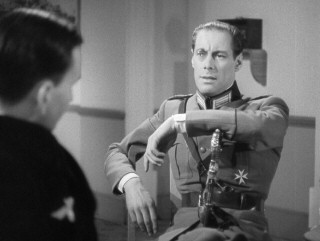 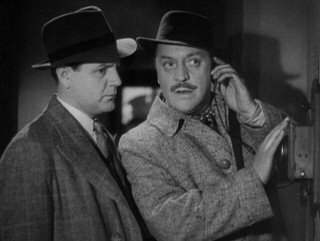
Night Train received a single Academy Award nomination for original story, earning recognition for author Gordon Wellesley, whose serialized novel Report on a Fugitive was apparently little more than a starting point for screenwriters Sidney Gilliat and Frank Launder. Gilliat and Launder, who had been in collaboration since the advent of sound film, would become a regular team with this film, henceforth sharing or divvying up producing and directing duties for decades to come. While many of their works remain as relatively unheard of as Night Train is today, the duo did helm the original four St. Trinian's girls' boarding school comedies, which were recently remade/rebooted.
Respected director Carol Reed continued to work in film sparingly but significantly for over thirty years to come. Today, he is celebrated more for his classic noir The Third Man (1949) than for his much-decorated film musical Oliver!, winner of the 1968 Best Picture and Best Director Oscars.
At first glance, Night Train to Munich appears to be one of countless vintage black and white films that didn't make it to DVD until now. In fact, it did appear on something called Mystery & Suspense Collection, a 2004 DVD from public domain specializing Madacy Entertainment that also held Lockwood and Dirk Bogarde's Cast a Dark Shadow and Edward G. Robinson's The Red House. That presumably unpresentable 3-movie disc is now long out of print and though studios have shied away from catalog titles and turned their attentions to putting new, recent, and evergreen fare on Blu-ray, Night Train finally gets a DVD all its own this week. Not only that, but it does so as part of The Criterion Collection, claiming spine #523 in this (at least initially) DVD-only release.
 |
DVD Details
1.33:1 Fullscreen (Original Aspect Ratio)
Dolby Digital Mono 1.0 (English)
Subtitles: English for Hearing Impaired
Not Closed Captioned; Extra Not Subtitled or Captioned
Release Date: June 29, 2010
Single-sided, dual-layered disc (DVD-9s)
Suggested Retail Price: $29.95
Clear Keepcase |
VIDEO and AUDIO
Night Train to Munich is presented windowboxed in 1.33:1, true to its original Academy Ratio composition. Picture quality isn't perfect, but it's about as close as it could be for a small 70-year-old film. A few shots exhibit grain and dirt, I spotted a couple of blink-and-miss jumps, and there are a handful of noticeable scratches. For the most part, though, the video is remarkably clean and detailed. The Dolby 1.0 soundtrack isn't as easy to compliment, but I think that aged, limited recordings are chiefly to blame. The dialogue is occasionally hard to make out. The English subtitles definitely help.
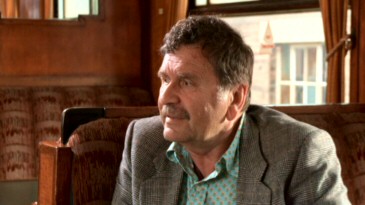 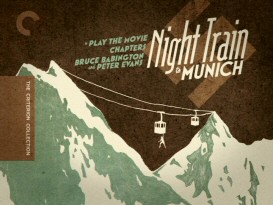
BONUS FEATURES, MENUS and PACKAGING
Unusual for a Criterion DVD, Night Train to Munich is accompanied by just a single on-disc bonus feature. True to the studio's standards, it is a substantial one. "Bruce Babington and Peter Evans" (29:20) is a new video discussion between two published film historians. The friendly blokes sit on a grounded train to chat about writers Gilliat and Launder, director Carol Reed, the lead actors and their parts, and what Charters & Caldicott say about British humor and gentlemanliness. The talk is complemented by apt film excerpts. Much preferable to an audio commentary, this sheds light on the picture and its creators without lulls or feature-length time commitment.
On most DVDs, I'd now move to discussing superficial things like what promos play at disc insertion (here, as always, none, as Criterion shuns even a widely-accepted commercial impulse). Besides noting that this DVD is packaged like all of the studio's new ones in a clear keepcase (the reverse side displays an unlabeled European map), I must comment upon the quality booklet expectedly included here. It lists chapters, cast, and crew, then devotes four pages to "A Last Laugh", an excellent essay on Night Train by British critic/historian Philip Kemp. Nice, clear stills from the film adorn about half of the booklet's sturdy pages.
In Criterion fashion, the menus are simple but fast-loading 4:3 screens. They're silent and static, with the main menu closely resembling the DVD's front cover and the bonus feature menu offering a write-up of the lone supplement.
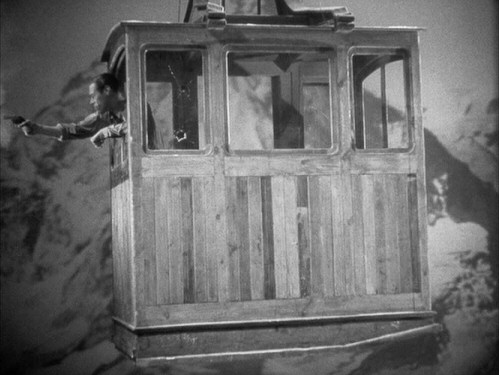
CLOSING THOUGHTS
The little-known Night Train to Munich is a thoroughly entertaining thriller. It's interesting to see the young Second World War being used to tell a fun tale of intrigue, secret identities, and double crossings. Such frothiness and levity wouldn't again be applied to WWII for quite some time. While the film falls short of greatness, which somewhat explains its unfamiliarity today, it is certainly good and not a far cry from Hitchcock's 1940s work. The worst you can charge the film with is some unconvincing miniatures and effects and a few historical inaccuracies.
Night Train's solo DVD debut from Criterion costs more than it would from any other studio, but that's fair, since this disc is more satisfying than any major or minor studio would likely give a largely forgotten 70-year-old film, regardless of its famous director and leading man. Though the DVD is far from packed (one at least expected to find the film's trailer and Academy Award Theater radio program here), both the featurette and essay booklet are insightful and appreciated. More importantly, the film itself looks pretty terrific here.
More on the DVD / Buy from Amazon.com
 |









